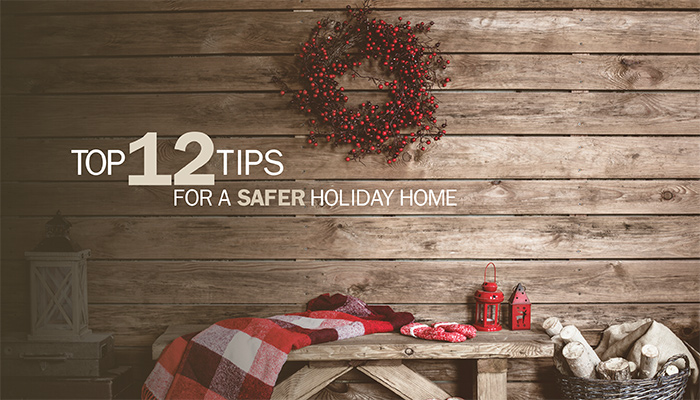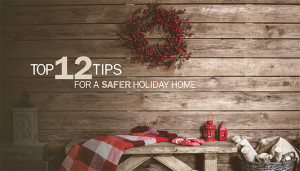12,000 people or more are going to visit the emergency room this holiday season thanks to hidden dangers around the house. With the upcoming festivities at hand, now is the perfect time to survey your home and address potential safety hazards. Here are 12 tips to make sure you spend the holidays safe at home with family and friends… and out of in a cold and crowded ER.
The Top 12 Safety Tips
- GOOD LIGHTING— Adequate lighting reduces the risk of tripping and falling both inside and outside your home. Critical areas that need to be illuminated are the stairs, outdoors, and foyers. The fix: Make sure adequate wattage is utilized and long-life bulbs and motion detectors are in place.
- ELECTRICAL PROBLEMS?— Electrical issues, like a flickering light or a dead outlet, can be mild annoyances that actually signal serious dangers. If not addressed promptly, a faulty electrical system can result in house fires and shocks. The fix: Contact a professional right away. In your daily life, make sure electrical cords are not frayed and extension cords are securely connected. Unplug small appliances, space heaters, and power tools when not in use.
- DO ROUTINE CLEANING— Not maintaining appliances leads to a greater chance of accidental home fires. The fix: Do simple tasks regularly like cleaning grease off your stovetop, emptying the lint trap on your dryer, and keeping your chimney clean and clear.
- SMOKE & GAS DETECTORS— Every home needs functional warning devices that detect smoke and gases. The fix: When purchasing smoke alarms, make sure they also detect carbon monoxide, a deadly gas that is especially dangerous because it is colorless and odorless. Replace the batteries every six months.
- SECURE YOUR HOME— Many homes now have the latest technological advancements but still rely on locks and hardware from decades ago to keep you safe from intruders. The fix: Do an audit of all entry points to your home—doors and windows and screens. If any do not have secure screens, locks, and deadbolts, have them installed.
- WHEN YOU’RE AWAY— Being away makes your home vulnerable to intruders. The fix: Create the illusion that someone may still be there. Leave a TV or stereo on, have a neighbor pick up mail and the daily paper. Turn down phone ringers, keep blinds drawn, and don’t leave unsecured valuables in the home even if you think they are well-hidden and never hide keys around the home.
- HOUSEHOLD REPAIRS— Even if you are an expert and know your way around electrical, plumbing, car or other household repairs, proceed with caution. A poor repair could be a recipe for disaster. The fix: Call a professional or ask us for a referral from our trusted sources.
- VEHICLE CAUTION— Remember that there is danger even before you drive on the street. The fix: Be cautious and proceed slowly when driving vehicles in or out of your driveway. If your driveway does not have good visibility in both directions, walk down and look in both directions before you get in your car.
- MAKE IT SAFE FOR VISITORS— If you are hosting friends and family, consider what additional safety challenges they may face. The fix: Put yourself in the shoes of a small child and look for low, hard edges, sharp objects, easy-to-open cabinets with chemicals and cleaning agents. Look for falling and tripping hazards that may fell seniors.
- BRACE YOURSELF— Heavy objects are rarely braced in the home. Appliances, artwork, TVs, and aquariums present real hazards if they are knocked down by a person or a natural disaster. The fix: Strap and brace heavy objects and use security hardware for large artwork.
- UNCOVER HIDDEN DANGERS— If your home was built before the late seventies, there’s likely lead paint on a wall layer or in the varnish on hardwood floors and potentially asbestos in “popcorn” ceiling textures. The fix: Hire a licensed contractor to test for possible contaminants and remove them safely, especially prior to a remodel.
- MOTHER NATURE— Your homeowners insurance will cover you in many instances, but did you know that you may not be insured against natural disasters like earthquakes, floods, tornadoes, and hurricanes? The fix: Contact your insurance agent to make sure you have adequate replacement coverage as home values escalate and coverage amounts can stay static.
If you would like our advice on how to make your home safer and need a list of trusted sources for home repairs, please contact us today. It’s our business to ensure that your home is safe and secure for your famil



